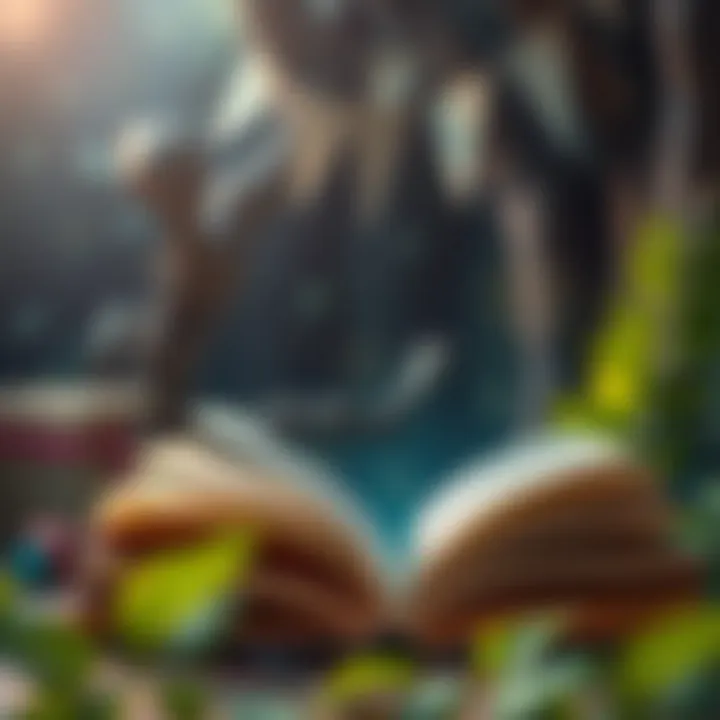Exploring Ten Transformative Reads for Insightful Minds


Intro
In the quest for knowledge and understanding of the human experience, literature serves as a timeless vehicle for exploration. Books not only provide entertainment but also offer profound insights and tools for personal development. Throughout this journey, we will examine a thoughtfully selected group of ten impactful books that stand out in their ability to resonate across different eras and cultures. Each book is a lens through which we can examine ourselves and our place in the world, challenging our perspectives and deepening our understanding of what it means to be human.
This guide is crafted for intellectuals, students, professionals, and avid readers seeking substance in their literary pursuits. Through a careful curation of genres—from transformative fiction to practical self-help—we intend to shed light on diverse themes while encouraging meaningful engagement with the texts. Our exploration will also dive into the contemporary relevance of these works, articulating why they matter today and how they can catalyze personal growth.
Diving deeper, we shall categorize these essential reads into two main themes: Self-Help and Personal Development and Fiction with Transformative Themes. Each category has its own unique contributions to the reader's journey, highlighting different aspects of growth and discovery. As we navigate through the summaries and insights of the selected books, readers will glean key takeaways that can be applied in daily life, fostering a continuous cycle of learning and reflection.
On this path, one can emerge not just as a reader but as a thinker, ready to grapple with complex ideas and partake in the ongoing dialogue of human existence. Ultimately, these books invite us to read with intention and reflection, challenging what we know and inspiring us to envision new possibilities.
Prelude to Essential Reading
In a world flooded with information, the art of reading holds significant value. It's not just about flipping through the pages or scrolling through e-books; it’s about truly grasping the messages encoded within the words. Understanding what drives individuals to read can illuminate one’s journey through literature and intellect. The act of reading shapes perspectives and enhances critical thinking. It’s a conduit for knowledge, a tool for comprehension, and a means to traverse different worlds and experiences. With the right guidance, readers can embark on a searching voyage that expands their horizons.
Defining the Purpose of Reading
Reading serves many purposes. Whether it’s for escapism, knowledge, or even inspiration, each reader finds unique motivations tethered to their life circumstances. For one, picking up a book can be a refuge from the chaos of everyday life. Others may be searching for answers to more profound queries—questions about existence, societal structures, or personal dilemmas. Moreover, in academia and professional settings, reading functions not only as a means to gain information but also to refine skills, challenge beliefs, and cultivate empathy.
When one reflects upon the reasons behind their reading habits, it reveals more than just a pastime; it unveils personal desires for growth and understanding. For instance, a student might delve into classic literature to appreciate historical contexts, while a business professional might choose non-fiction to gain insights into leadership strategies. This exploration, rooted in curiosity, leads to discovery and offers opportunities to connect more deeply with various facets of human experience.
The Importance of Curating a Reading List
Curating a reading list is as much about choice as it is about direction. A well-planned list directs one’s reading journey, ensuring that each selection builds upon the last. This thoughtfully crafted collection can be likened to a map guiding a traveler through uncharted territories. Without such a map, readers can feel lost and overwhelmed by the sea of available options. Thus, a clear reading list serves multiple functions:
- Focus: A curated list helps to prioritize what’s essential, preventing distraction from multitude.
- Exploration: It encourages readers to step outside their comfort zones, inviting them into new genres and authors.
- Meaningful Engagement: As readers choose books with intention, they often find stronger connections to themes and messages, enriching their understanding.
Additionally, developing a curated reading list allows for a more profound form of engagement—one that can transform a casual reader into a lifelong learner. It challenges individuals not only to consume literature but to reflect on it critically. In weaving together diverse texts, one often gains multiple perspectives, which can illuminate thoughts and ideas in a way that solitary reading might not.
"A book is a dream that you hold in your hand." – Neil Gaiman
Ultimately, the importance of curating a reading list lies in its potential for personal and intellectual growth. As readers embark on their literary journeys, the precise targeting of purpose—be it for entertainment, knowledge, or insight—can lead not only to enjoyment but also to transformation.
Criteria for Selection
Choosing the right books to include in a list of essential reads is no small feat. This section delves into the criteria that guide this selection process, ensuring that the chosen titles resonate with readers in both a personal and cultural context.
Literary Impact
Literary impact refers to the influence a book has on readers, writers, and society as a whole. When selecting essential reads, it’s crucial to consider how a work shapes or shifts the literary landscape. For instance, George Orwell’s "1984" has left an indelible mark on discussions around privacy and government, sparking debates that still echo today.
The books of note often serve as a catalyst for change, inspiring movements or popularizing certain ideas. A strong impact can be assessed by not just the number of copies sold, but also through its longevity in discussions across various media. Works that challenge norms or provide a unique perspective on a universal theme often qualify as high-impact literature.
"Books are a form of real estate; their value appreciates as they serve as vessels for ideas that sustain society."
Thematic Depth
Thematic depth encompasses the richness of ideas and concepts within a narrative. Books loaded with layers upon layers of meaning invite readers to return multiple times, uncovering new insights each go-around. For example, in Virginia Woolf’s "To The Lighthouse," the exploration of time, grief, and human consciousness provides an experience that evolves with each reading.
Evaluating thematic depth also involves recognizing how well a book engages with fundamental issues—be it love, identity, conflict, or morality. Here, depth acts as a magnet, drawing readers into a deeper understanding of themselves and the world around them. Undoubtedly, selecting books that exhibit a range of themes can stimulate thought and discussion, enriching the reader's journey.
Cultural Relevance
Cultural relevance highlights the importance of a book in reflecting or influencing its societal context. As the world shifts and evolves, the literature that arises from it often mirrors those changes. Books like "The Handmaid's Tale" by Margaret Atwood explore themes of power and gender roles, resonating strongly in contemporary conversations about rights and freedoms.
When curating essential reads, one must assess the resonance of a book in current discussions surrounding identity, race, technology, and more. A book that serves as a commentary on its time can ignite conversations, encourage understanding, and foster connection among readers. Therefore, cultural relevance is a vital criterion, ensuring that the selected titles not only endure but also speak to the pressing issues of today.
These criteria—literary impact, thematic depth, and cultural relevance—form the backbone of our exploration into the top ten books. By applying these standards, we create a curated list that not only entertains but also enlightens, positioning readers to better engage with the myriad experiences that literature offers.


Top Ten Books Overview
Curating a list of essential reads is no small feat. It involves more than just picking titles that are popular or recommended by critics. In this section, we explore the vital role the top ten books play in shaping our understanding of various themes and human experiences. These selections provide a roadmap, guiding readers through different genres, perspectives, and styles. The intersection of literary prowess and subject matter expertise makes it imperative to consider what these books offer.
Unlike fleeting trends in modern literature, the top ten books are often enduring classics or groundbreaking modern works. They push boundaries, provoke thought, and encourage deep reflection. Readers who dive into these selections often find themselves changed, their views expanded or challenged. The experience isn’t merely a passive absorption of words but an active engagement with ideas.
Exploring the Classics
Significance of Timeless Literature
Timeless literature stands tall, offering an anchor in a rapidly changing world. The novels and poems that have lasted through generations not just entertain; they challenge our perspectives and offer wisdom soaked in historical context. By reflecting on themes like love, betrayal, struggle, and triumph, these works resonate with the human soul across time.
A key characteristic of timeless literature is its exploration of fundamental human experiences. Whether it’s Shakespeare’s emotional turmoil in Hamlet or the societal critiques found in Pride and Prejudice by Jane Austen, these narratives encapsulate conflicts that are still relevant today. They serve as mirrors reflecting our own dilemmas, sparking critical thought and self-examination.
An essential advantage of including these classics in our reading lists is their ability to foster empathy. As readers step into the shoes of characters facing life’s trials, they gain insights into diverse cultures and experiences. The disadvantage, perhaps, is that newer readers may find the language archaic or the pacing slow in comparison to fast-paced modern novels.
Key Titles to Consider
Identifying key titles within the realm of timeless literature can be an adventure all its own. Consider works like To Kill a Mockingbird by Harper Lee, which confronts issues of racial injustice and moral growth. Such reads become not just stories, but essential critiques of society and prompts for discussions that resonate today.
The key characteristic of including titles like The Great Gatsby is their ability to encapsulate the spirit of an age. They don’t merely tell a story; they capture a moment in history and human behavior and weave it into a narrative that demands reflection. A unique feature of these titles is their capacity to remain pertinent, often finding new audiences and interpretations over decades.
However, one must consider the potential challenge of accessibility. Some may find older works cloaked in elaborate prose or societal norms that now feel outdated. Yet, this very distance can serve as a profound learning opportunity for readers willing to explore, decode, and engage with the text.
Modern Must-Reads
Identifying Contemporary Influencers
Modern literature reflects the dynamism of current society. Identifying contemporary influencers involves looking at authors who not only tell powerful stories but also shed light on pressing contemporary issues. For instance, works by Chimamanda Ngozi Adichie, like Americanah, grapple with identity and race in a globalized world, contributing to ongoing cultural conversations.
The significance here lies in how these influencers challenge traditions, often breaking molds and redefining genres. They compel us to think critically about the changing landscape of literature and the diverse voices that rise within it. One compelling aspect is their engagement with societal realities, bringing stories that represent the mosaic of modern life.
Yet, a potential drawback is that some works may feel too tailored to current trends, risking timelessness. Despite this, the value of their exploration of relevant topics cannot be understated, making them crucial selections for our list.
Examining Current Trends in Literature
The ever-evolving nature of literature reveals current trends that are often shaped by societal shifts and technological advances. Genres like speculative fiction have surged, with titles such as The Handmaid's Tale by Margaret Atwood gaining renewed attention in the light of socio-political shifts.
Examining these trends helps elucidate the themes and narratives capturing readers’ imaginations. Contemporary literature often explores concepts of identity, power, and technology, mirroring the complexities of modern life. This relevance can make the experience of diving into modern must-reads feel immediate and necessary.
However, reliance on trends can sometimes overshadow storytelling quality. A reader could find themselves facing works that feel more like commentaries than narratives. Balancing these aspects is vital when choosing modern selections that will have lasting impacts.
Non-Fiction Selections
Understanding the Power of Real Narratives
In the realm of non-fiction, the power of real narratives cannot be overstated. These books provide authentic accounts that resonate with truth, grounding readers in the reality of human experience. Works like Educated by Tara Westover illustrate resilience and the pursuit of knowledge against all odds.
The significant characteristic here is the emotional weight that comes with true stories. They often feature journeys of personal and societal transformation, encouraging readers to engage with real-world issues. Such narratives foster a connection that fictional representations might not achieve.
However, the impact of non-fiction can be a double-edged sword. Readers must approach some topics with a discerning mind, as bias and subjective interpretation can color the narrative. Nonetheless, the insights gained often far outweigh any potential drawbacks, creating a compelling argument for their inclusion in essential reading lists.
Recommended Titles in Non-Fiction
When recommending titles in the non-fiction sphere, it's crucial to select works that provoke thought and promote understanding. Books like Sapiens: A Brief History of Humankind by Yuval Noah Harari challenge preconceptions about human history and progress, inviting readers to ponder their place in the continuum of time.
The essential factor of these recommended titles is their ability to stimulate intellectual curiosity. They don’t shy away from complex ideas and instead invite discussion. One unique feature is the incorporation of interdisciplinary perspectives, allowing readers to draw connections across various fields of study.
On the downside, readers with a preference for narrative-driven writing may find some non-fiction overly academic or dense. Still, the sheer wealth of knowledge available makes these selections indispensable for those yearning to expand their horizons.


Book Analyses
When we talk about diving into the fabric of literature, we can’t skip the significance of thorough book analyses. Analyzing texts cuts through the surface, allowing the reader to grasp deeper meanings, intricate details, and the artistry behind the words. By dissecting characters, themes, and real-world implications, we create pathways for better understanding the human condition. It’s not just about reading; it’s about experiencing the narrative in a manner that transforms perception and fosters empathy.
Understanding how characters evolve and how themes resonate across cultures equips readers with the ability to engage critically with literature. Critical engagement encourages a willingness to question, interpret, and ultimately appreciate the nuances in writing. This exploration adds layers of insight, making the journey of reading all the more enriching.
Diving into Fictional Worlds
Character Development
Character Development is a cornerstone when immersing in fictional worlds. It gives life to stories, allowing readers to connect on emotional levels that are often profound. The growth of a character throughout a narrative mirrors our own experiences, and this relatability elevates the reading experience.
A key characteristic of effective character development is the depth and complexity of the characters. Well-developed characters possess distinctive traits that make them memorable. For example, experiences, motivations, and flaws blend to form realistic personas that resonate with readers. This relatability drives engagement, urging readers to invest emotionally.
One unique feature of character development is its capacity to evoke empathy. As characters navigate their journeys, readers witness their flaws and triumphs, allowing them to reflect on their own lives. However, a disadvantage could emerge if characters lack depth, leading to a disconnect, or if they embody clichéd traits that lack authenticity. In this article, we delve into character arcs that have influenced readers and illustrate the transformative nature of engaging fiction.
Themes and Symbolism
Themes and symbolism are vital elements that enrich our understanding of literature. These aspects allow authors to weave complex ideas into their narratives, encouraging readers to think critically about the world around them. By examining underlying themes and symbols, readers can uncover the messages authors aim to convey within their works.
One prominent characteristic of strong themes is their universality. Themes such as love, loss, and resilience speak to the values and experiences shared among humanity. This universality makes them a popular focus in literary analyses, as they offer avenues for deeper discussions about societal constructs and personal motivations.
Symbols, on the other hand, often act as concentrated vessels of meaning. A recurring motif, like a river representing change, can elevate a narrative to new heights. However, the disadvantage lies in that interpretations can vary widely, sometimes leading to misreading or oversimplification of a work’s intent. In our analyses, we dissect these aspects, exploring how they contribute to the richness of literature and the relevance they maintain in contemporary discourse.
Unpacking Non-Fiction Insights
Key Arguments and Takeaways
When exploring non-fiction, the focus shifts to the key arguments and takeaways. This aspect highlights how authors ground their work in reality, providing readers with insights that can shape perspectives and inspire action. The effectiveness of an argument often lies in its clarity and relativity to real-world issues.
The hallmark of a strong argument is its grounding in research and evidence, allowing readers to follow a logical path toward conclusions. In an increasingly complex world, clear arguments challenge perspectives and stimulate thought.
Moreover, takeaways are crucial in that they distill complex ideas into digestible insights. These insights empower readers to apply lessons to their own lives, promoting growth and understanding. However, some arguments can veer into biases or oversimplifications, which necessitates critical engagement from readers. Through our analysis, we take care to examine the robustness and applicability of these insights in order to provide a balanced view.
Real-World Applications of Concepts
Real-world applications of concepts in non-fiction works bring practical relevance to theoretical discussions. This aspect is about bridging knowledge and action; it transforms the ideas into tools for problem-solving and personal growth. By demonstrating how concepts are applicable in everyday life, readers gain a sense of agency and direction.
A significant characteristic here is the use of case studies or real-life examples, which bolster the author’s arguments and inspire readers to extrapolate these ideas into their own contexts. Such practical application encourages a proactive attitude toward learning, helping readers to see beyond words on a page.
Nevertheless, a downside could be that not all concepts lend themselves to direct application, which might lead to frustration for readers seeking clear pathways. As we dissect these connections, we aim to illuminate how certain principles can be utilized in various domains, enriching the readers' grasp of lived experiences.
"Books are not just vessels of stories but mirrors reflecting our thoughts and ideologies. By analyzing them, we can glean wisdom and understanding that goes beyond the written words."
As we navigate this intricate realm of literature through book analyses, we enhance our reading journey, creating a more profound connection with the text and revealing the myriad ways literature shapes our understanding of the world.
Impact of the Selected Books
The impact of the selected books in this curation is profound. Not only do these works stir emotions and provoke thought, they shape how we perceive ourselves and the world around us. Engaging with literature can be viewed as a transformative journey; each page offers the opportunity to internalize new ideas, perspectives, and challenges. This article highlights the significant effects literature has on both personal and societal levels.
Books invite us into different realities, allowing us to inhabit the skin of characters from far-flung places or drastically different eras. They inspire change and foster empathy, which in turn can drive one to make impactful choices in their own lives. Analyzing these transformative experiences is crucial because of the potential they carry to broaden our horizons.
Transformative Experiences
Exploring impactful literature often leads to significant personal development. Readers may find themselves confronting difficult truths or igniting a passion for a cause. For example, reading "The Grapes of Wrath" by John Steinbeck not only introduces one to historical injustices but can fuel activism and advocate for social change. The experiences portrayed can resonate deeply, prompting reflection on our own circumstances and societal issues.
- Understanding Empathy: By stepping into the lives of characters, readers often experience feelings that mirror their own or even connect with situations they’ve never faced. This engenders a sense of empathy that is both educational and spiritually enriching.
- Challenging Perspectives: Works such as "A Tale of Two Cities" by Charles Dickens encourage a reassessment of preconceived notions about history, class, and morality. As they explore resilience and sacrifice, readers are challenged to reflect on their values and priorities.
Transformative experiences through literature can leave an indelible mark on the reader, often leading to life-altering decisions, an expanded worldview, or even a newfound appreciation for the nuances of human existence.


Enhancing Critical Thinking
The process of reading is inherently linked to the exercise of critical thinking skills. Each book offers complexities that push readers to analyze, dissect, and engage with the text in meaningful ways. Literature doesn’t serve merely to entertain but also to challenge intellect and spark deep conversations.
- Analysis of Themes: Readers must often navigate layered themes, complex character motivations, and intricate plots. For instance, "1984" by George Orwell requires one to think critically about the implications of surveillance and government control, stimulating discussions that are more relevant in our increasingly digitized age.
- Interpretation of Symbols: Critical thinking is further honed through symbolism and subtext. The use of metaphors in literature, such as those in "The Great Gatsby" by F. Scott Fitzgerald, compels readers to look beyond the surface, connecting deeper meanings to broader societal critiques.
Engagement with literature aids in sharpening analytical abilities, making connections across varied contexts and calling upon readers to dissect arguments critically.
Reading not only informs but transforms. It shapes our ability to think critically about the world, emphasizing the necessity of these selected works in understanding our shared human narrative.
Further Exploration of Genres
Diving into the world of literature requires more than merely picking up a book. It’s about journeying through the various genres that provide distinct perspectives and modes of expression. The importance of exploring genres lies in the broadened horizons it presents. Readers can encounter ideas and narratives that push the limits of conventional storytelling. By venturing beyond just fiction, we embrace a multifaceted understanding of the human condition. Each genre offers unique insights and appeals to different sensibilities, thus enriching our reading experience and fostering a deeper connection with the content.
Expanding Beyond Fiction
When we discuss the relevance of genres outside the realm of fiction, it's vital to highlight the impact of biographies and memoirs.
The Value of Biography and Memoir
Biographies and memoirs serve as windows into lives and experiences, bridging personal and historical narratives. They not only unveil the journeys of fascinating individuals, but also provide lessons that resonate with our own lives. The key characteristic of this genre is its rooted authenticity—it's not some far-off tale but rather a reflection of real struggles, victories, and adversities.
In this article, including biographies can effectively humanize issues and events, allowing readers to view history through a personal lens. Unique features of biographies often include intimate details and personal anecdotes which can be deeply relatable or profoundly enlightening. The disadvantage, however, could be the potential for bias, as they may lean heavily on the subjective perspectives of the author.
Science and Philosophy in Literature
Another genre that enriches our literature landscape is the intersection of science and philosophy. This blend challenges our perceptions of existence, ethics, and the universe. The key characteristic here lies in the analytical inquiries this genre presents, inviting readers to ponder complex questions about life and our place in it.
In relation to our goal of curating essential reads, science and philosophy offer profound insights into critical societal issues and ethical dilemmas. The unique feature of this genre is its ability to merge empirical evidence with philosophical reasoning, creating a compelling argument for exploring the intricacies of human thought and scientific discovery.
However, a challenge of engaging with this genre may be the dense nature of some works, which can deter casual readers. Nonetheless, the rewards of grappling with such texts can vastly enhance one’s critical thinking skills and understanding of the world.
Emerging Authors to Watch
As the literary landscape constantly evolves, paying attention to emerging authors is crucial. These writers often bring fresh perspectives that disrupt traditional narratives and push boundaries. Engaging with their work not only supports new voices but also keeps readers in tune with current literary trends. Emerging authors frequently explore contemporary issues or revisit past themes with a new twist, challenging readers to think differently. By amplifying lesser-known writers, we not only enrich our reading lists but also contribute to a more diverse and inclusive literary conversation.
As we broaden our reading experiences across genres—be it through biographies, philosophy, or fresh voices—we not only expand our understanding of human narratives but also foster a richer connection within the larger tapestry of literature.
End: The Journey of Reading
Reading isn't just about words on a page. It’s an adventure that engages the mind and heart, forging connections between the reader and the world. The journey of reading leads one down pathways of knowledge, understanding, and empathy. This article has explored a curated selection of ten valuable books, each one a portal, offering new perspectives. Through this exploration, we can appreciate not only the artistry of storytelling but also the profound impact these narratives can have on our lives.
The books we’ve discussed are threads in the vast tapestry of human experience. They provoke thought and stimulate discussion, making readers reflect on their own lives and the world around them. Recognizing the importance of these narratives is essential in developing a more comprehensive understanding of not just literature, but also the society and culture that shapes our thoughts.
"Books are a uniquely portable magic." – Stephen King
As we find ourselves amidst an ever-evolving landscape of literature, it is crucial to consider how the journey of reading can become a lifelong pursuit. This quest allows us to redefine our values and deepen our insights, making it a vital aspect of personal development. In reflecting on this experience, we recognize reading as a means of enhancing both intellect and emotion, revealing the richness of the human condition.
Reflecting on the Experience
Looking back on the selections within this list, readers should take a moment to engage in self-reflection. Each book offers a unique lens, allowing for varied interpretations based on one’s own life experiences. For instance, how does a character's struggle resonate with your own challenges? Maybe a particular theme strikes a chord, encouraging you to reconsider your worldview?
Reflecting involves not just passive acknowledgment but active engagement with the material. Is the underlying message about resilience in the face of adversity? Or perhaps your focus is on the social commentary woven through the narrative? Each reading experience is personal, and taking the time to unpack these elements can lead to deeper appreciation.
Additionally, engaging in discussions about these works with peers or through online platforms like reddit.com can further enrich the experience. Sharing insights and contrasting perspectives allows readers to widen their understanding, moving beyond their own interpretations. Remember, every book can be a conversation starter, leading to new friendships or even challenging existing beliefs.
Encouragement for Lifelong Reading
The final and perhaps the most compelling aspect of the reading journey is the encouragement for lifelong engagement with literature. Reading is not meant to be a fleeting phase; it’s a skill to be nurtured and cherished throughout one’s life. Whether you’re digging into biographies, indulging in science fiction, or delving into philosophical treatises, the realm of literature is vast and inviting.
To foster this habit, consider establishing a reading schedule or joining a book club. These communities provide accountability and inspire you to explore genres or authors you might not have considered otherwise. Setting small, achievable reading goals can also prevent overwhelm. Start by committing to a book a month, or maybe even dive into a few pages each day.
Moreover, the advent of digital platforms makes accessing literature easier than ever. E-books and audiobooks from sources like en.wikipedia.org or britannica.com can supplement your reading routine and introduce you to new ideas and authors. By embracing these resources, you can ensure that your reading journey continues, adapting to your ever-changing interests and the dynamics of the world.
Ultimately, the importance of fostering a lifelong reading habit lies in the quest for knowledge, understanding, and growth. Each turn of the page opens up new horizons, and every story exposes us to the extraordinary nuances of humanity. In the end, the journey of reading is one that promises continual discovery and enrichment.















